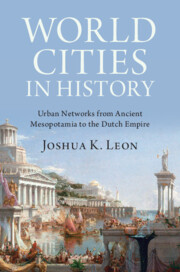Book contents
- World Cities in History
- World Cities in History
- Copyright page
- Dedication
- Contents
- Figures
- Acknowledgments
- 1 Introduction
- 2 Origins of Urbanization
- 3 Agora and Emporia
- 4 Alexandria, Alpha City
- 5 City Networks in the Roman Empire
- 6 Tale of Two Chang’ans
- 7 City-State Civilizations
- 8 Baghdad
- 9 Italian Communes and the Rise of Venice
- 10 Profit and Power
- 11 Urban Power in the Dutch Empire
- 12 Reflections
- References
- Index
2 - Origins of Urbanization
Mesopotamian City Networks
Published online by Cambridge University Press: 12 December 2024
- World Cities in History
- World Cities in History
- Copyright page
- Dedication
- Contents
- Figures
- Acknowledgments
- 1 Introduction
- 2 Origins of Urbanization
- 3 Agora and Emporia
- 4 Alexandria, Alpha City
- 5 City Networks in the Roman Empire
- 6 Tale of Two Chang’ans
- 7 City-State Civilizations
- 8 Baghdad
- 9 Italian Communes and the Rise of Venice
- 10 Profit and Power
- 11 Urban Power in the Dutch Empire
- 12 Reflections
- References
- Index
Summary
The first city networks were as old as the first cities. The mud brick metropolises of the fourth millennium were built to accelerate a burgeoning regional trading system. Settlements were linked, for example, through the alpha city of Uruk. This chapter also explores the later Babylonian and Ur “world systems.” These were effectively knowledge-based global cities at the heart of robust trading networks. With the advent of the city came the first bureaucratic administrators finding advantages in large concentrated forms of living in a hitherto decentralized world. The strange new idea was hardly normal. Cities were labor intensive, dangerous places that exacted high demands on their populations. With their invention came new social hierarchies. The movement of unprecedented global resources through cities required seminal bureaucratic breakthroughs—not least of which cuneiform writing. This increased the power of a privileged few, extracting exorbitant tribute and labor. Cities were in reality systems of concentrated power and global resource management whose walls functioned to keep their populations in, rather than simply to repel invaders.
Keywords
- Type
- Chapter
- Information
- World Cities in HistoryUrban Networks from Ancient Mesopotamia to the Dutch Empire, pp. 22 - 46Publisher: Cambridge University PressPrint publication year: 2024

